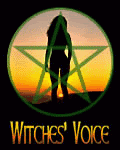 The Spring Equinox, Ostara, is upon us. The most potent aspect of this holiday is the balancing of the earth's gravity midway between the extremes of light and dark at Winter and Summer Solstice. In fact, try this:
The Spring Equinox, Ostara, is upon us. The most potent aspect of this holiday is the balancing of the earth's gravity midway between the extremes of light and dark at Winter and Summer Solstice. In fact, try this:
On the day of the Vernal or Autumnal Equinox, just a few moments before the exact moment of the equinox, go outside with a raw egg. Find a reasonably level place on the sidewalk or driveway. For a few moments just before and just after the equinox, you can balance the egg upright (wider end down) by simply setting it down on the ground.
Another aspect of this holiday is the symbolism of the egg. The egg is one of the most notable symbols of Easter. Now, I was raised Catholic and believe me, I asked but was never told why we colored eggs at Easter, or why there was a bunny who delivered candy to us and I always wondered about this holiday. Easter has adapted many ancient Pagan symbols and customs in its observance.
Easter gets its name from the Teutonic goddess of spring and the dawn, whose name is spelled Oestre or Eastre (the origin of the word "east" comes from various Germanic, Austro-Hungarian words for dawn that share the root for the word "aurora" which means " to shine"). Modern Pagans have generally accepted the spelling "Ostara" which honors this goddess as our word for the Vernal Equinox.
This is how the 1974 edition of Webster's New World Dictionary defines Easter:
"orig., name of pagan vernal festival almost coincident in date with paschal festival of the church; Eastre, dawn goddess; 1. An annual Christian festival celebrating the resurrection of Jesus, held on the first Sunday after the date of the first full moon that occurs on or after March 21."The Vernal Equinox usually falls somewhere between March 19th and 22nd (note that the dictionary only mentions March 21st, as opposed to the date of the actual Equinox), and depending upon when the first full moon on or after the Equinox occurs, Easter falls sometime between late-March and mid-April.
Easter traditions and how they relate to Pagan traditions:
The traditional coloring and giving of eggs at Easter has very Pagan associations. Eggs are clearly one of the most potent symbols of fertility, and spring is the season when animals begin to mate and flowers and trees pollinate and reproduce. In England and Northern Europe, eggs were often employed in folk magic when women wanted to be blessed with children. There is a great scene in the film The Wicker Man where a woman sits upon a tombstone in the cemetery, holding a child against her bared breasts with one hand, and holding up an egg in the other, rocking back and forth as she stares at the scandalized (and very uptight!) Sargent Howie. Many cultures have a strong tradition of egg coloring; among Greeks, eggs are traditionally dyed dark red and given as gifts.
As for the Easter egg hunt, I have heard a rather scary history to this. As with many elements of Pagan "ancient history, " there is little or no factual documentation to back this up. With that being said, the story goes like this:
Eggs were decorated and offered as gifts and to bring blessings of prosperity and abundance in the coming year; this was common in Old Europe. As Christianity rose and the ways of the "Old Religion" were shunned, people took to hiding the eggs and having children make a game out of finding them. This would take place with all the children of the village looking at the same time in everyone's gardens and beneath fences and other spots.
It is said, however, that those people who sought to seek out heathens and heretics would bribe children with coins or threats, and once those children uncovered eggs on someone's property, that person was then accused of practicing the old ways.
The Easter bunny - well this is easy. Rabbits symbolize fertility and Spring is all about fertility and new life!
Source: witchvox.com












